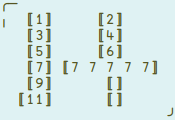One lane is closed, the vehicles have to thread their way in according to the zip-lock system: One car from one lane, the next car from the other lane, always taking turns.
Input: Two vehicle queues, represented e.g. as strings, in which short cars are represented by individual symbols, lorries by several identical symbols. The queues may be of different lengths and may even be empty. Symbols may appear more than once. If your language does not support strings, you can also use two lists (see second set of test data) or other forms of input as long as the purpose of the task is not lost.
Output: A vehicle queue in the same representation. The traffic jam is long enough, so at least the source code should be as short as possible!
Test data:
Nzzll,iaaee --> Nizzaallee
aabcddddeeeee,1112345555611 --> aa111b2c3dddd4eeeee5555611
foo+bar ooooooooooooooooooooo --> fooooooooooooooooooooooo+bar
feeeuve553iiiiiiiiiii, --> feeeuve553iiiiiiiiiii
UvtMCaegIYuiet,poeyhllnefoLkI --> UpvoteMyChallengeIfYouLikeIt
Test data for languages that do not support strings:
[1,3,5,7,9,11],[2,4,6,7,7,7,7,7] --> [1,2,3,4,5,6,7,7,7,7,7,7,9,11]
[4,9,9,13,13],[41,41,41,1,11,44] --> [4,41,41,41,9,9,1,13,13,11,44]
[] [2,6,4,3,3,56,8,5,4,3] --> [2,6,4,3,3,56,8,5,4,3]






